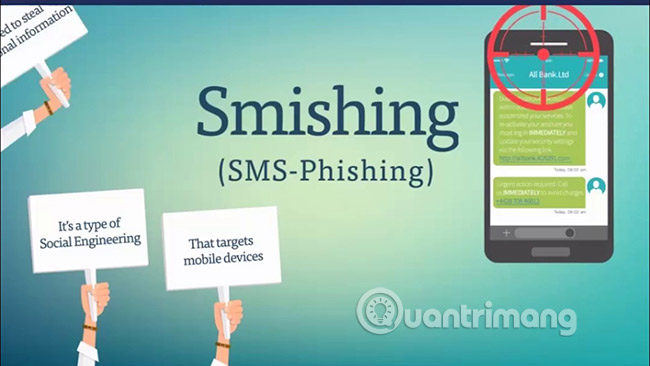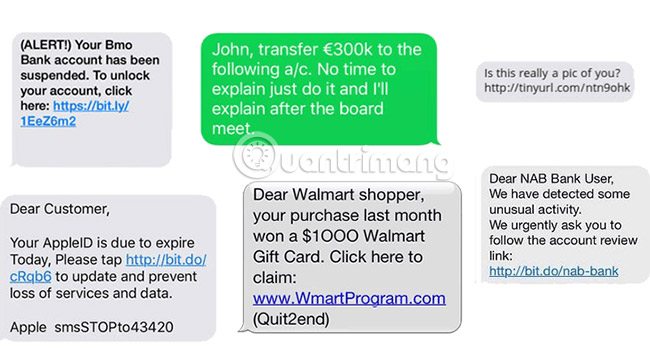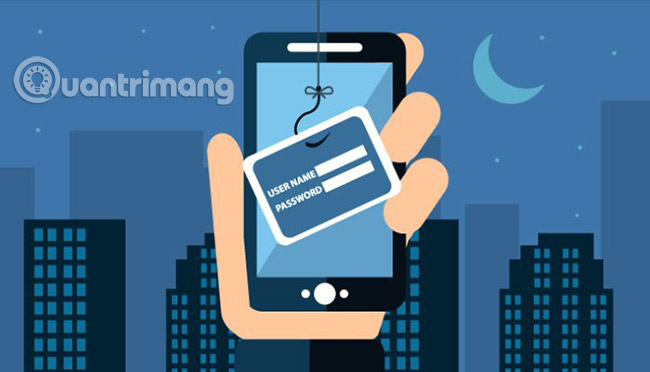Smishing - Serious security threat
Phishing is still a serious security issue. According to some reports, there is a malicious email for every 101 emails, and most of them use some form of Phishing to do phishing tactics. Most people are aware of Phishing, but only consider threats when checking email.
Criminals are one step ahead. According to security experts, Phishing has begun to turn to texting and it also brings more potential risks than email attacks.
Smishing, a Phishing form, is when someone tries to trick you into giving them private information via text messages or SMS messages. Smishing is becoming a new and increasingly dangerous threat in the online world. Read the following article to find out what Smishing is and how people can protect themselves from it.
Learn about Smishing
- What is smishing?
- Discover secrets about how cyber criminals exploit Smishing
- What can be done against Smishing?
What is smishing?

Simply put, Smishing is any type of scam related to text messages. Usually, this scam form involves SMS text messages or phone numbers. Smishing is especially scary because most people tend to trust a text message rather than an email. Most people are aware of the security risks involved in clicking a suspicious link in an email. But this is not entirely true when it comes to text messages.
Smishing uses social engineering techniques to force you to share your personal information. This strategy promotes the victim's beliefs in order to obtain that person's information. The information the fraudster is looking for can be anything, from online passwords to social security numbers or credit card information. Once the scammers get that information, they can register new credit under the victim's name. That is when the victim actually has a problem.
Another option that scammers use is to say that if you don't click on a link and enter personal information, you'll have to pay a daily fee to use the service. If you have not registered the service, please ignore the message. If you see any unusual charges in your credit card account or debit card statement, contact your bank. They will be responsible for protecting their customers.
Discover secrets about how cyber criminals exploit Smishing
Users are making a lot of efforts to protect their smartphones, such as passwords, fingerprint scanners, or even facial recognition. Like a car's security system, users assume that these measures help prevent bad guys and help personal data become safe. But when someone becomes a victim of Smishing, they are willing to give fraudsters anything and are not aware of it.
NordVPN recently published a report to try to raise awareness for everyone, about how serious a breach of security has become. The report calls it smishing or SMS phishing. NordVPN's communications director, Ruby Gonzalez, said: 'Some old Phishing techniques were applied to mobile text messages instead of email. While smartphones are becoming increasingly popular, personal email usage is on the decline. This not only refers to text messages, but also Facebook messages, etc. People are accustomed to receiving suggestions sent via messages, including links. But it is also a new and more open path for criminals and they are trying to make the most of this advantage. '
Gonzalez said that, like collecting a lot of email accounts, cyber criminals took phone numbers from databases on black websites and then tried to lure victims to share personal data.
The most common form of this phishing scheme is a text message containing an automatic download link of malware, then malware can steal all kinds of different data. Smart phones reveal more information about users than PCs, so an installed malware can steal phone numbers in the victim's contact list and spread the virus in hopes of numbers. The amount of target can multiply exponentially. Even important personal data, such as bank information or user location, may be at risk.

Another tactic is to forge a legitimate and famous organization (a rather classic method). In some cases, phishers are tax authorities. This is becoming an increasingly worrying issue in the UK and Canada. Gonzalez noted that during periods of tax collection, these types of attacks became extremely popular. The fact that a text message often brings a sense of security, because many people do not know text messages can be a serious security threat.
Gonzalez said: 'The fraudsters tell the victim that they are due to have a refund or need to provide some additional information to the tax authorities. Basically, they try to get financial information from the victim, and use this information to steal money from the victim's account. '
Automatic text messages are more popular than ever. And users are also getting used to automatic messages. This inadvertently opens up huge opportunities for scammers.
Answering phishing messages will put you at risk. In America, Gonzalez mentioned shortcodes as a commonly exploited tactic. They are often used by organizations like charities, to send texts directly to supporters and allow them to donate money with just a brief answer. Scammers used the same system to steal money from the victim's bank account immediately.
This problem is much more common than what people imagine. According to Gonzalez, in the UK, 1 in 3 people become victims of Phishing in the past 6 months. Statistics also show that two out of every five people reported a scam, meaning the real number was even worse.
What can be done against Smishing?

The biggest problem with Phishing today is that it is very difficult to detect. While most people think that they will never be victims of Phishing, many people have fallen into this situation and have not even realized anything until it is too late. As mentioned above, scammers target people's fears about security or finance and there are some practical things you can do to stop scammers.
Firstly, never click on a link or reply to an unusual message. Though it was only a little suspicious of something, the vigilance of the guard would never be excessive. That includes a call to action to compose the message 'abc' if you want to stop receiving these messages. Try searching the Google content of the message if it seems a bit suspicious.
Sometimes criminals have a huge phone number database and if they get feedback, they will know that the phone number is working. Therefore, the feedback message with the expectation of not receiving similar messages can actually be counterproductive. If the message comes from a company and requires strange things like a password or contains a link, find the correct phone number of the company on the internet, call and verify that the message is really Does that company send it? Not clicking on any link is a thing to note, unless you are sure that it comes from a legitimate source.
Installing anti-malware software on your phone is also a good thing to do. Some people believe that smartphones are not infected with malware like computers, but Gonzalez said the truth is not so.

'There is a lot of malware targeting mainly phones, especially Android phones, because Android is an open system. In the past few years, there have been scandals with applications infected with malware, even in Google Play Store. Having an anti-malware for your phone is just as important as equipping antivirus software on your laptop or desktop computer. '
Some VPN companies also offer additional support in this area. NordVPN has a unique feature in its security applications called CyberSec, which acts as a content blocker, applicable to the user's entire operating system. It checks addresses based on a huge database from this company's block list.
Finally, if you find yourself at risk of being threatened by some malware, do whatever you can to protect your data, such as changing all passwords or using a password manager. encrypted for maximum security for important information.
See more:
- Prevent attacks to steal your information
- What is Spear Phishing?
- How to block phishing attacks in Firefox 3